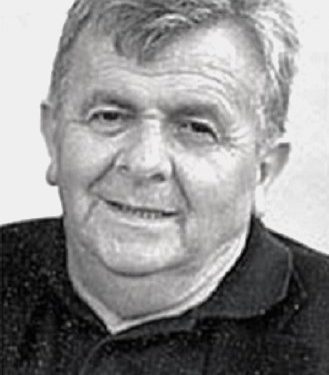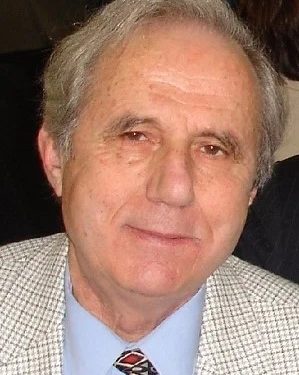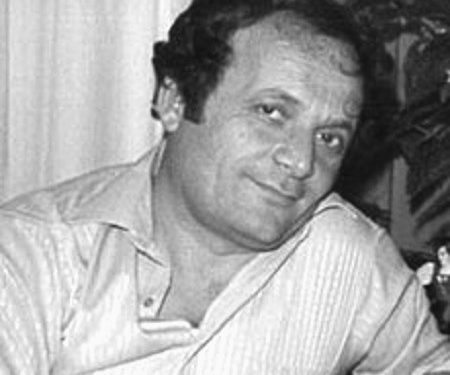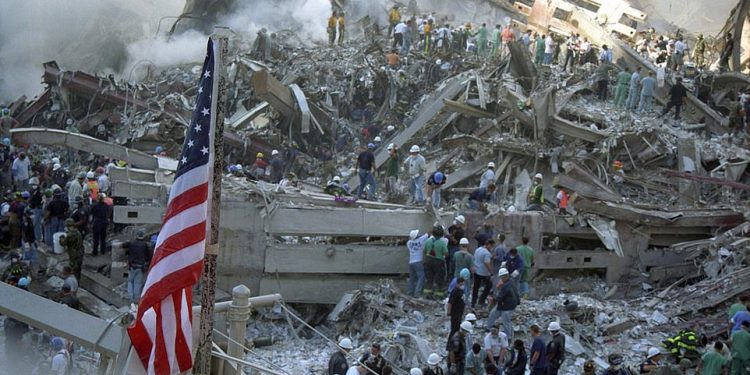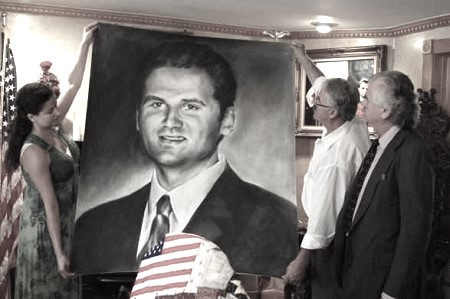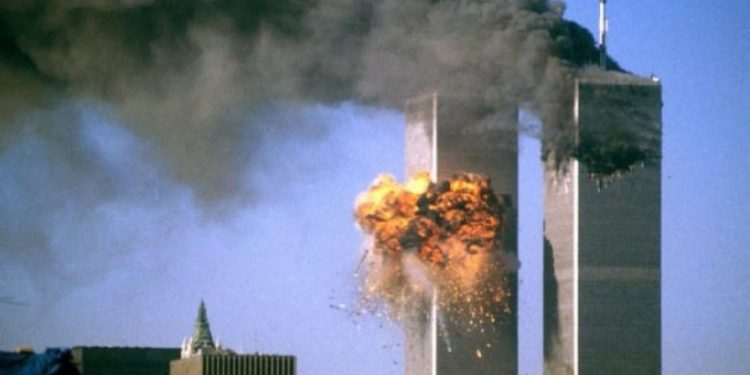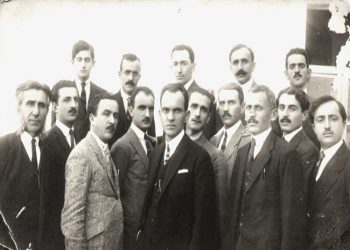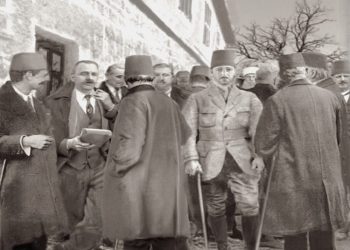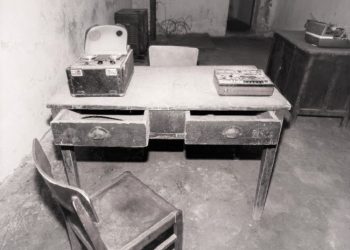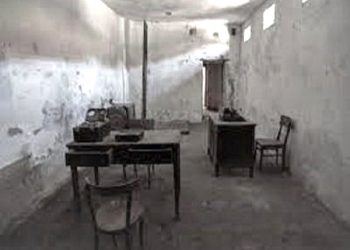– In memory of the terrorist acts of Islamic fundamentalists on September 11, 2001, where among the 2,981 victims, three of our compatriots also lost their lives: Frrok Camaj, Mon Gjonbalaj, and Simon Dedëvukaj –
Memorie.al / On the morning of September 11, 2001, I was at home in North Quincy, Boston, and was slowly preparing to leave for the “Logan” International Airport in Boston, where my wife, Natasha, and I both worked as security employees. Suddenly, from the news broadcast by CNN, I learned that a domestic flight had hit one of the “Twin Towers” in New York. Was it an incident? No, because shortly after, another plane struck the second tower. It was then I understood that this was not an incident, but a deliberate and horrific terrorist act. I then learned that both planes had been hijacked by fundamentalist terrorists. And these terrorists were Arabs.
I don’t want to dwell on other details of the events that followed, because I have described them in the pages of the novel, which, thanks to the care of Mr. Nasir Aijaz, was published in 26 episodes in the pages of the magazine “Sindh Courier,” published in Karachi (Pakistan), which he directs. But since that day, the idea to write a long story faintly took root in my mind.
Even more so because around noon that day, from radio-television news broadcasts, we learned that these terrorist acts were carried out with the knowledge and approval of the head of Islamic fundamentalist terrorism, Bin Laden, who was hidden somewhere in the highlands of Afghanistan during that period. But, nevertheless, this idea remained hazy in my mind. However, over the following days, I read with great attention the daily American newspapers that came to us at the airport and were dedicated to this unimaginable tragedy, which was simply called 9/11.
I thus became acquainted with the history of the Taliban, the criminal activity of Bin Laden, the doctrine of the fundamentalists preached by him, the history of the “Twin Towers,” and a similar attempt that had happened a few years earlier in one of the towers. But, nevertheless, I couldn’t manage to find the threads that would help me build the composition structure and the characters that would move within the lines of this prose.
Then, unable to find the key to realize this difficult creative work, I gave up. For weeks and months, and even for several years, I waited to read a literary work about 9/11. In fact, several novels were published, but none of them described how this tragedy happened, how terrorists were able to pass so casually through one of the check-points of Terminal ‘B’ of Logan International Airport, Boston.
In 2005, the famous American director, Oliver Stone, released the successful film WTC (World Trade Center), but even this film was dedicated only to the heroism of the firefighters, many of whom, after the collapse of the “Twin Towers,” with their brave interventions in the ruins and the surrounding buildings that also collapsed, saved hundreds and hundreds of people, even giving their lives. Thus came the year 2008. Again in America and globally, books dedicated to 9/11 were published, but again, none to tell what happened in the two planes that struck the “Twin Towers” during this tragedy of unimaginable proportions.
The Spark of Inspiration
But one day, I flipped through the book “Shqiptarët e Amerikës” (The Albanians of America), a major work by Vehbi Bajrami, a well-known journalist and publicist from Kosovo and director of the Albanian newspaper ‘Illyria’ published in New York. And, suddenly, I stopped at the chapter; “Albanians who remained in the ruins of September 11…” I had heard about these Albanians, but it had never occurred to me that they, a total of three, among nearly 3,000 victims in the “Twin Towers,” could be the characters of a literary work.
They were Frrok Camaj, Mon Gjonbalaj, and Simon Dedëvukaj, from the Albanian regions of Montenegro. Through them, the threads of the events that had occurred in the “Twin Towers” would be unraveled, to which other characters would be added…! But to create variety, one would be from Kosovo, a second from the Albanians of Montenegro, and the third an Arbëresh, i.e., Albanians who settled in Southern Italy as early as the 15th century to escape the Turkish occupation – who, like the first two, worked as window cleaners on the high floors of the “Twin Towers.”
Another setting for the action would be one of the planes hijacked by the terrorists, where the main characters include five of them, two flight attendants, the two pilots, and several passengers. As is known, none of them survived, because this plane, as well as the other one that struck the “Twin Towers,” turned to dust and ash. But it is understood that after seizing one or two of the flight attendants, the terrorists had killed the pilots, hijacked the plane, and used it to strike one of the towers. The same had happened in the second tower.
Another setting for the action of the novel would be a check-point in Terminal B, where among the employees, almost all of whom were immigrants, as they were in reality, was also Sokol Kama, or, more precisely, I was there, the former journalist of Albanian Radio-Television, in the guise of this character. They were joined by Arab terrorists, five of whom, with their real names, were those who hijacked one of the planes, and finally Bin Laden, as well as the architect of these attacks, Mullah Omar, who lived somewhere in the mountain caves of Afghanistan.
I had heard that a girl was traveling on one of the two planes that hit the twin towers, who was supposed to marry a journalist working on a television channel in New York at the end of September 2001 – a marriage that never took place, because she died along with all the other passengers on that plane. This very painful event, given the circumstances in which it occurred, served me to create the character of Zhaklina, a flight attendant on the plane making the final trip from Boston, because she is going to marry the journalist Steve, who works at CNN.
After studying materials to even more deeply understand the history of the Taliban and Islamic terrorism in general, from sources on Google, in the spring of 2008, I began to write a novel titled: ‘Shtatori i gjëmës së madhe’ (The September of Great Calamity).
The FBI Visit
However, there was one detail I didn’t know. Were there check-points in the “Twin Towers”? But they no longer existed. So I went to one of Boston’s tallest skyscrapers, met one of the security employees there, and asked: whether, besides him on the ground floor of this skyscraper, there were other security employees on the upper floors?
He replied that he was new to this duty, so I should ask his boss, and he handed me a business card with the details of the Security office covering that skyscraper. It seemed excessive to arrange that meeting, so I began writing the first chapters of the novel.
One morning in early April 2008, I heard knocking at the apartment door. I opened it and saw facing me a middle-aged man, dressed in half military and half civilian clothes, with a pale face and a penetrating gaze, who, after greeting me, asked:
“I am from the FBI. Are you Skifter Këlliçi?”
“Yes,” I replied. “Can we talk for a while together?” Of course, I invited him into the living room. Without hesitation, he asked me again: “Did you go on a certain day and a certain time, to the skyscraper on ‘Washington Strit’ [Street], did you enter that skyscraper, and did you ask the Security employee to know…” I nodded. “Why?” he continued. It was then I remembered the reason that had prompted this FBI officer to come and meet me. I was under their surveillance.
I explained the reason…! I told him I was a writer and was writing a novel dedicated to 9/11. I also dared to explain to him that if the employees of the FBI and the FAA (Federal Aviation Administration), with a new regulation, had not allowed passengers to take small knives, small spray bottles of aromatic liquid, bottles of alcoholic beverages, scissors, and other sharp objects with them on the plane, the tragedy would not have happened, because with such means the terrorists had killed the flight attendants and the pilots, and thus had become masters of the planes.
I also added that my wife, Natasha, who worked as a supervisor at one of the check-points of one of the terminals, had several times explained to her superiors, and even to the employees of the FBI and FAA, that the aforementioned items should not be allowed for passengers to take with them on planes, because there was a risk that they would be turned into dangerous tools by potential terrorists.
The FBI officer regrettably acknowledged with only a slight movement of his head and showed me a photo of the moment I was talking to the Security employee in that skyscraper – a photo which he did not give me despite my request – and after greeting me, he left. A few months later, I finished writing the novel, which was published in May 2010 in Albania. Fortunately, it was warmly received by readers.
Here in America, my American colleague, Carrie Hooper, who, besides several other languages, also masters the Albanian language, reworked the translation by the Albanian translator, Anita Muharremi from Kosovo, and thus the novel ‘Shtatori i gjëmës së madhe’ with the title ‘Disaster September’ was published by Lulu Press. Recently, Mr. Nasir Ilijaz published the entire book in episodes in the Pakistani magazine ‘Sindh Courier’, which is published in English and, as he explained to me via email, has been well received, not only by Pakistani readers but also, thanks to the internet, by readers from other countries around the world. Memorie.al




